
Wasps and Bees
It’s hard to say which insect is more feared, the wasp or the spider. In fact, both insects have their place in our environment and it only takes a little knowledge to peacefully coexist with both. Stinging insects such as bees and wasps are beneficial, but they can also be a nuisance or even a danger if they nest near people. Here is some information about the different types of bees and wasps found in Missouri, as well as tips on how to deal with them.
Honey bees (pictured above) are the most familiar type of bee. They are important pollinators, and their honey is a valuable food source. Honey bees are not typically aggressive, but they will sting if they feel threatened. At certain times of the year, new queen bees are produced and the new queen will swarm with a few thousand worker bees. If a swarm settles in a place where bees are not welcome, such as the wall of a house, then they become pests. If possible, honey bee swarms should be picked up before they start to establish a nest in an undesirable location. Once a swarm establishes a nest inside a wall, the bees and the comb must be removed.
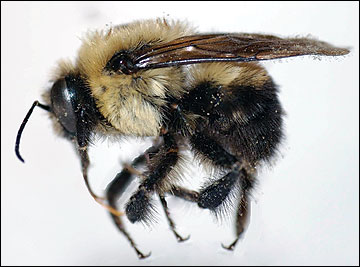
Bumble bees are similar to honey bees, but they are larger and have fuzzy, black and yellow bodies. Bumble bees are also beneficial pollinators, and they are not as aggressive as honey bees. They are social insects whose worker bees visit many different kinds of plants to collect pollen and nectar. Some farmers and gardeners encourage bumble bee activity by putting out hollow nesting boxes near their crops. Bumble bees seldom enter structures and do not behave very aggressively except in defense of their nest. Normally they are a nuisance only if they have built a nest close to human activity.
WASPS
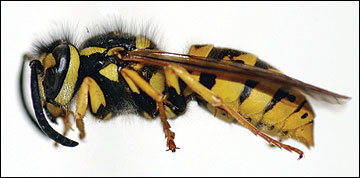
Yellowjackets are the most common type of wasp in Missouri. They are social insects that live in colonies. Yellowjackets are attracted to food, and they can be aggressive if they feel threatened. Yellowjackets can build their nests in the ground or above ground depending on the species and the situation. All yellowjackets aggressively defend their nests and will be most aggressive in late summer and fall. Because yellowjackets forage so widely, they pose a threat to humans even when they are not near their nests.
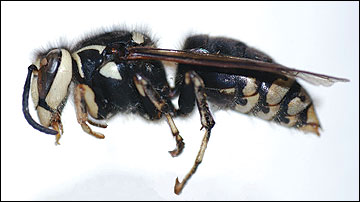
Baldfaced hornets are large, black wasps with white markings. They are also social insects that live in colonies and are beneficial because they capture non-beneficial insects to feed their larvae. Baldfaced hornets are not as aggressive as yellowjackets, but they can still sting so it’s best to leave them alone.
Below are some images displaying various types of wasp and hornet nests. If you see one of these on your property it’s best to call us, as wasp and hornet stings are quite painful and dangerous to anyone with allergies to their venom.
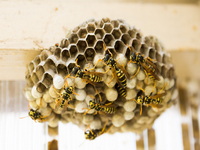
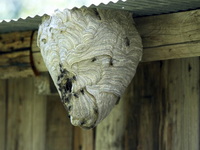
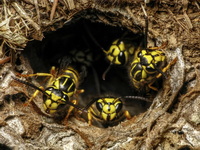
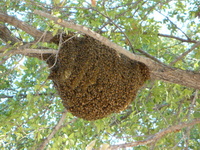
There are several other species of wasp that you may encounter in Missouri, chiefly the paper wasp and the mud dauber. These aren’t as much of a concern near your home as they aren’t as aggressive as the yellowjacket, but their stings, particularly the paper wasp, are incredibly painful. If you notice either species spending too much time around your house it’s best to call us before you get stung.
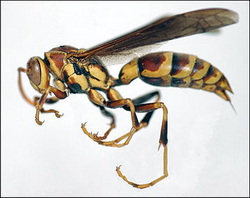
Dealing with wasps and bees
- If you find a bee or wasp nest, the best thing to do is to leave it alone. Bees and wasps are important members of the ecosystem, and they should not be killed unless they are a threat to human health or safety.
- If a bee or wasp nest is located in a dangerous or inconvenient location, you can call a professional pest control company to remove it.
- If you are stung by a bee or wasp, remove the stinger as quickly as possible. Apply a cold compress to the sting area to reduce pain and swelling. If you have an allergic reaction to bee or wasp stings, seek medical attention immediately.
- Bees are the most beneficial insect, and a beehive should never be destroyed, only moved by a professional.
- Yellowjackets will swarm and sting repeatedly anything they interpret as a threat. In some cases this can be life threatening. Do not attempt to deal with a wasp nest. We have trained professionals on staff to safely deal with this problem for you.